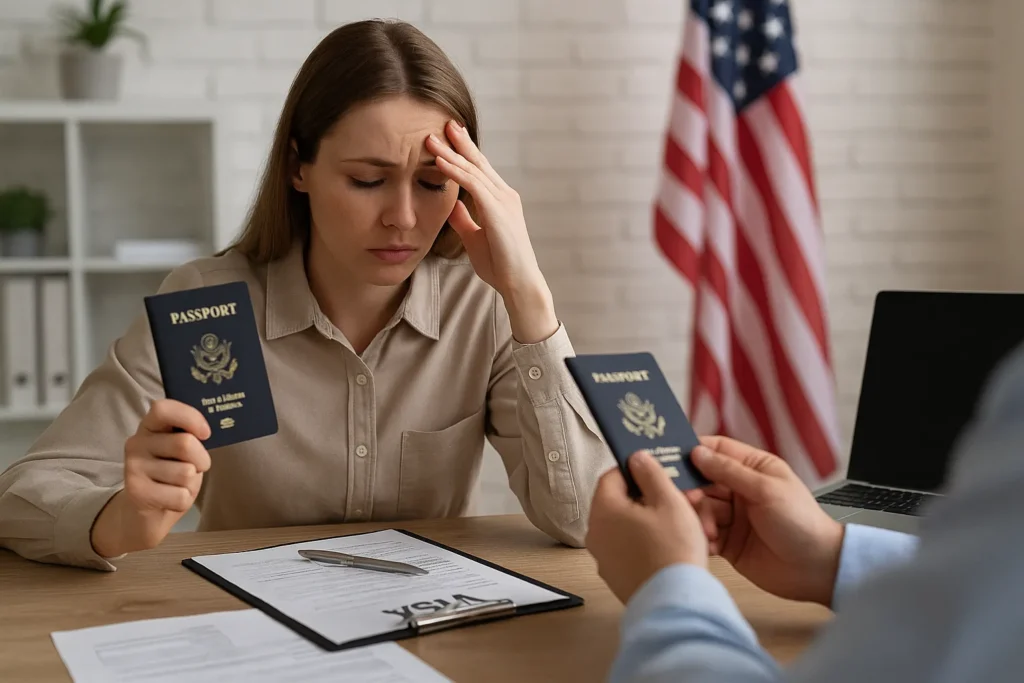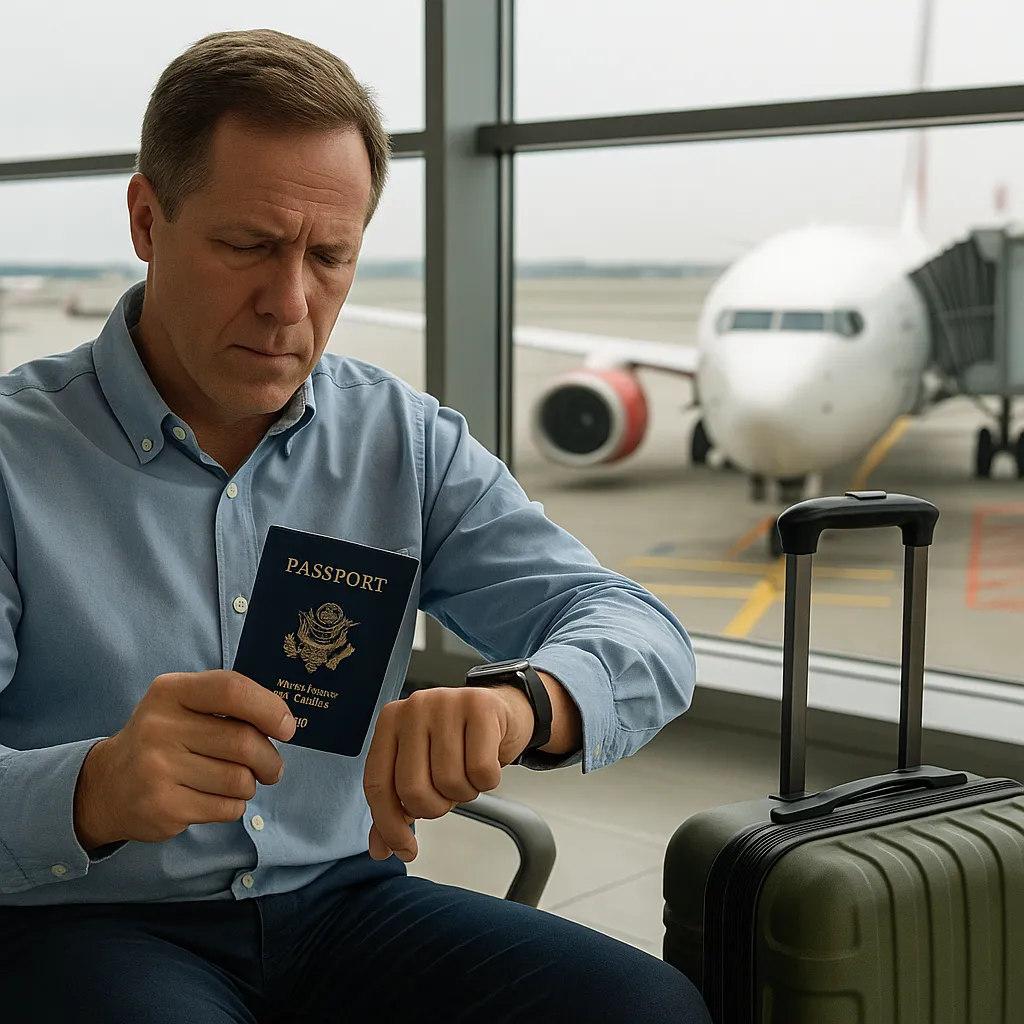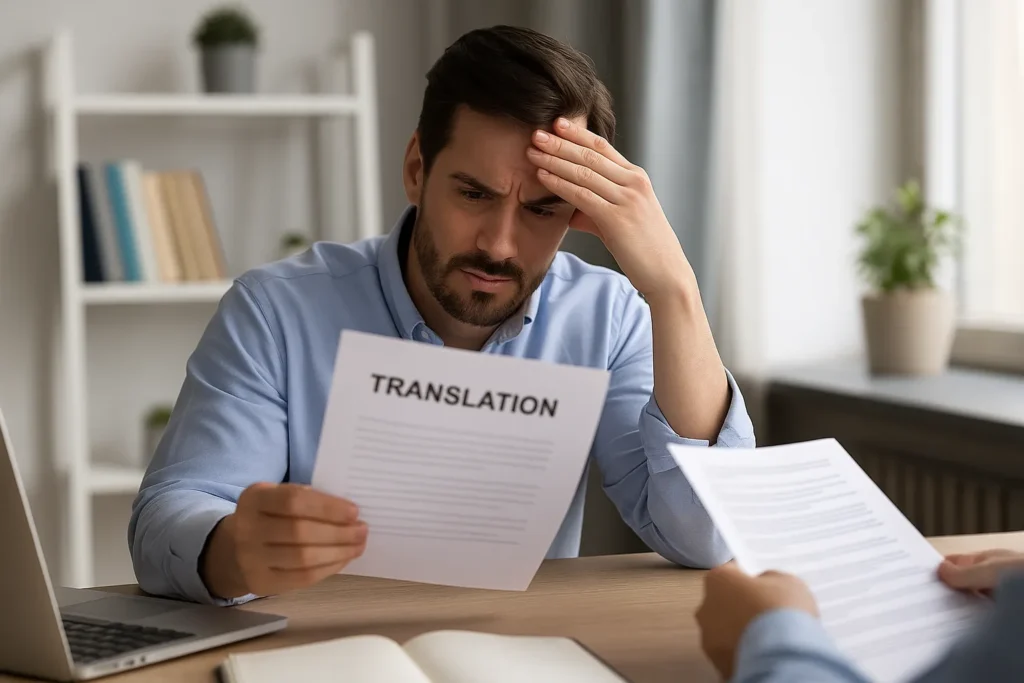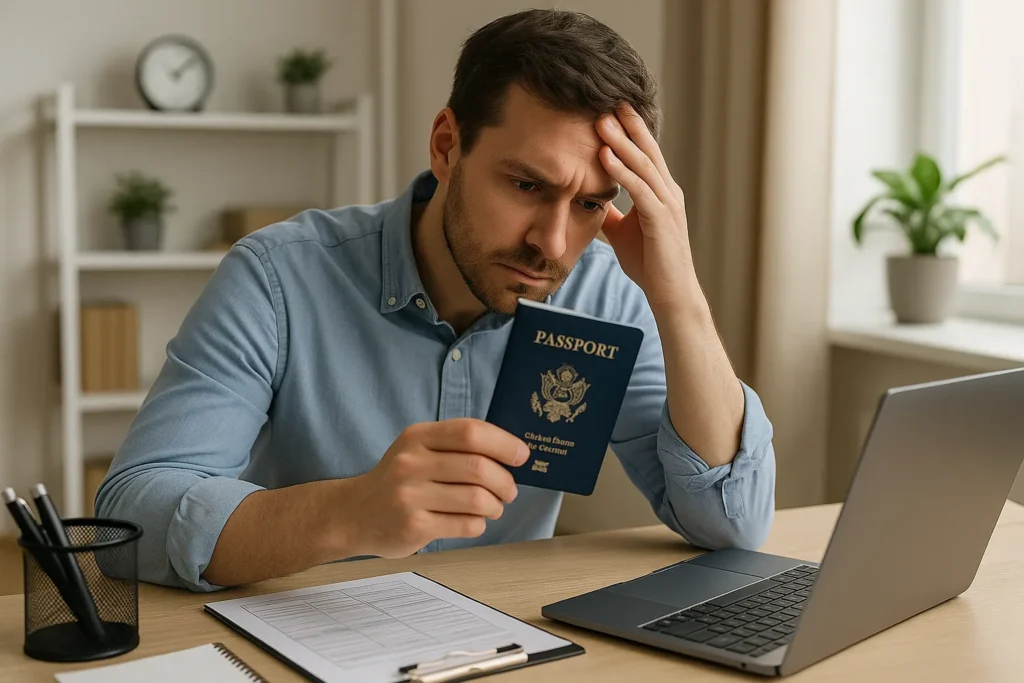You’ve locked in the offer. You’ve scoped out neighborhoods and dreamed of your new life in a foreign country. But one missed detail, one wrong document, or a visa form filled in too fast can quietly derail the entire thing.
Many expats think of their visa as just a formality. But that paperwork is the first real test of your move abroad. And it’s not one you can cram for the night before.
In this guide, you’ll learn how to avoid the most common visa mistakes people make. These mistakes can delay your plans, cost you money, or even get your application denied.
We’ll cover the visa approval process, requirements like health insurance, common document slip-ups, and cultural missteps that lead to confusion with immigration authorities.
Planning ahead makes all the difference. If you’re ready for a smooth and successful transition to your next job abroad, let’s get started.
Common Mistakes That Visa Applicants Keep Repeating
Why do so many visa applicants make the same mistakes over and over?
The process is full of unclear rules, shifting requirements, and small decisions that carry weight.

Ben was about to start his new job in a European country. He had his offer letter, a place to live, and bags packed. But the visa expiry date on his application didn’t match his employment contract.
One mistake. One oversight. And it got him sent back to his home country before he even started. It took him four months and a new employer to get another shot.
If this sounds like something that could happen to you, here’s where to be extra cautious:
Choosing the wrong visa type
This might be the biggest mistake of all. Tourist instead of a long stay visa, or a student visa without work permissions, is more than a typo. Choosing incorrectly can delay everything and raise red flags with authorities. The fix is to make sure your visa fits the work you plan to do and check if it needs employer sponsorship.
Skipping essential documents
Many applicants assume that one missing page won’t matter. It will. And if that page is a bank statement or your proof of accommodation, it could mean starting over from scratch.
Inconsistent or outdated details
An old address here or a date mismatch there might not seem like a big deal. But immigration officers often see those things as signs you didn’t take the process seriously. If you’re wondering how strict they are, the answer is very.
Need help staying organized? Here’s a piece on how to plan your overseas career move effectively. It’s full of tips that complement the visa process itself.
Your Entire Stay Needs to Match Your Visa Duration
How long are you planning to stay? And does your visa actually cover that timeline?
This is one of the most common oversights for new expats. When your dates don’t match, it creates confusion, stress, and even legal issues.

Let’s say your job contract is for 12 months, but your visa expires after 90 days. Or maybe your visa starts five days after your flight lands. These mismatches happen more often than you’d think, and they can derail everything.
Your visa can’t fall short of your job
If you’re using a short-stay pass but working full-time, you’re not complying with your visa terms. That can lead to fines or a full visa rejection. In some countries, even one day of overstaying can damage your record and affect future approvals.
That’s why it’s important to confirm your visa dates line up exactly with your work contract and travel plans.
Long-stay visa types give you more breathing room
If your stay is longer than 90 days, a long-stay visa is often required. It might come with extra steps, like providing a long-term lease, proof of income, or health documentation.
Avoid “visa runs” or re-entries
Some travelers try to reset short-term visas by briefly leaving and re-entering. But many immigration authorities now track patterns and could see this as abuse. That may get you flagged or denied entry on your return.
Still figuring out your plans? This article on common expat myths about working overseas is worth a look. It clears up assumptions that cause problems later.
Health Insurance Requirements: The Small Print That Can Get You Rejected
Think your travel insurance will cover everything? It probably won’t.
This is one of those visa requirements that many expats overlook until it’s too late.

Every country has its own health system and its own rules for visa applicants. Some require minimum coverage amounts. Others demand a specific type of insurance policy that includes medical emergencies or long-term care. If your documents don’t match these expectations, you might get denied without a second look.
Travel insurance isn’t the same as expat insurance
They sound similar, but the coverage is completely different. Travel policies usually cover short-term emergencies. Many immigration authorities want proof of full medical coverage for your entire stay, including pre-existing conditions. Some even request a policy in their local language or from a local provider. This is where a lot of people get tripped up, especially if they’re applying online and think any policy will do.
You might need to provide proof before approval
Some consulates ask for the actual certificate, while others accept a confirmation letter. Either way, don’t assume you can upload it later. It’s often a required step before they even start reviewing your visa application.
Medical expenses can be a deal-breaker
If your policy excludes certain treatments or has unclear terms, it might not meet that country’s health insurance requirements. And yes, they do check.
(I once spoke with someone whose visa was rejected over a missing hospital coverage clause. She had to cancel her contract and lost her flight money.)
If you’re confused about what kind of coverage you need, start by checking the official embassy page of the country you’re applying to. Each lists acceptable providers or coverage details. Some even link to comparison tools or certified insurance agencies.
Local Culture and Legal Rules: More Connected Than You Think
Can a cultural misunderstanding get you in legal trouble? In some countries, yes.
That’s why learning the local culture isn’t just polite. It’s practical.

You might already know that rules vary from one foreign country to another. But many new expats don’t realise how closely those rules reflect local traditions and behaviours, and how ignoring those can lead to visa problems.
Knowing What’s Legal (and What’s Not)
Not every country posts a clear “don’t do this” list. What’s normal in your home country might violate local standards somewhere else. For example, in Japan, working remotely on a tourist visa is prohibited. Violating that rule can result in immediate removal from the country.
Some places require you to register your address with the authorities within days of arrival. Missing that deadline could lead to fines or delays in your next application.
These rules are often tied to deeper cultural values around trust and transparency.
Legal Rules That Surprise Expats
- No work on a student visa in many places, even if it’s freelance or remote
- Notify your landlord or housing office if someone moves in, especially where rental terms are linked to immigration files
- Report your address within 72 hours of arrival, which is mandatory in countries like Russia
According to the latest Expat Insider report, over 44% of expats report difficulty understanding local administrative rules. That confusion often leads to small mistakes with big consequences.
(If you’re wondering why everything feels so complicated, you’re not imagining it. Every rule you miss might mean a delay or rejection.)
Next, we’ll talk about something just as sneaky. Translation mistakes and documentation errors quietly derail visa applications all the time, and we’re going to look at how to avoid them.
Translation Errors and Paperwork That Get You Denied
Could one word in the wrong language cause a visa rejection? Unfortunately, yes.
Visa officers aren’t mind readers. They want everything in the format and language they asked for. If it’s not right, your application could be pushed aside or rejected without further notice.

Many visa applicants overlook this step. They think uploading a scan or submitting a simple copy will do the trick. But across many countries, your application might be delayed or denied simply because the document is untranslated, unofficial, or unverified.
Translations Need to Be Certified
If your documents aren’t in the official language of the country you’re applying to, you’ll almost always need certified translations. This doesn’t mean using Google Translate. It means hiring someone officially recognized, sometimes even approved by the embassy.
Some countries want the original and the translated document submitted together. Even small formatting issues can cause confusion or rejection.
That’s why it helps to contact the embassy or consulate directly to ask what they’ll accept before uploading your documents.
Paperwork That Trips People Up
- Bank statements with incorrect currency formatting
Some countries ask for local equivalents to be shown clearly. Others need a conversion reference. - Missing proof of accommodation
Even if you’re staying with a friend, a formal letter or rental contract with their name and ID might be required. - Photos that don’t meet visa guidelines
Visa photo rules are stricter than passport photos. They may include exact dimensions, specific backgrounds, or neutral facial expressions. (I once heard from someone whose application stalled because their bank statements were password-protected. No one could open them, and they had to start over.)
These small details might feel minor, but they can cause long delays or rejection. Visa officers are trained to spot and decline anything unclear or non-compliant.
Next, let’s look at a surprising source of help. Expat communities can help you avoid costly mistakes before they happen.
Why Expat Communities Are Your Best Source of Insider Knowledge
Think official embassy websites have all the answers? Think again.
Some of the most accurate, up-to-date info you’ll get doesn’t come from government portals. It comes from people who’ve already done what you’re trying to do.

When you’re applying for a visa, every country has its own quirks. And when the rules change, they don’t always show up online right away. That’s where expat communities step in to fill the gaps.
Real People, Real Answers
One of the biggest benefits of expat forums, Facebook groups, and local chat networks is the level of detail you’ll find. People talk about what documents worked, what didn’t, and which steps surprised them.
I’ve seen users post updated checklists, embassy-specific notes, and even screenshots of approval emails.
While it’s smart to verify everything with official sources, having real-world feedback gives you context that a website can’t.
Where to Look
Here are some helpful places to start:
- Regional Facebook groups like “Expats in Berlin” or “Digital Nomads Spain”
- Reddit threads such as r/expats or r/IWantOut
- Community chat apps like WhatsApp or Telegram, often shared through local schools or coworking spaces (You might be wondering if it’s okay to ask basic questions. Yes, it absolutely is. Most people in these groups remember being in your spot and are happy to share what they’ve learned.)
Next up, we’ll talk about something you can’t fix at the airport. Applying too late can completely derail your visa plans, and timing is everything.
Why Last-Minute Visa Applications Rarely End Well
Ever booked a flight before your visa was approved? It’s riskier than you think.
Sam had a job lined up, documents ready, and a flight booked just two weeks away. His visa didn’t arrive in time. He lost his seat, missed his onboarding, and had to reapply from the beginning.

It’s a story that repeats more often than it should. Many expats underestimate how long the visa application process really takes. Embassy delays, public holidays, or extra paperwork requests can throw everything off.
The Visa Timeline Isn’t Flexible
- Many countries ask for in-person interviews, fingerprint scans, or health screenings. These steps often take weeks to schedule.
- Student visa and long-stay visa applications usually require advance approval from multiple departments before you can travel.
- The chance of visa rejection increases if your file looks incomplete or rushed. This includes mistakes in translated documents, missing financial records, or mismatched dates.
- Applying early gives you time to correct any issues without risking your start date.
A Simple Planning Tip
Start with your job’s first day and work backwards. Allow extra time for processing, translation, or document certification. Don’t forget to account for holidays in your home country and the one you’re moving to.
I’ve seen delays happen because someone forgot that their embassy would be closed for a holiday they’d never heard of. That small detail ended up costing them a full month.
Next, we’ll bring everything together with a set of practical steps to help you start your new life abroad with confidence.
Let’s Make Your Visa the Start of Something Great
You’ve come this far. Don’t let a piece of paper stop you from living abroad.
Visa problems feel small at first. But they can delay your move, drain your savings, or even cost you a job offer. The good news is that most of these mistakes are easy to avoid with the right approach.
Double-check your paperwork. Ask questions in expat groups. Don’t assume that what worked for someone else will work for you. Every country has its own process, and many expats learn that through tough experiences.
You don’t have to be perfect. What matters is staying curious, organized, and proactive when the system feels slow or confusing.
That’s part of building a smooth and successful transition into your new life abroad, not just your new job.
Looking for a solid next step? Here’s a useful guide on how to make your career transition abroad easier. It walks you through what happens after the visa is approved and how to settle in with more confidence.
(I’ve helped many expats at this stage, and trust me, it’s worth the effort. You’ll be glad you got it right.)








 </a
</a